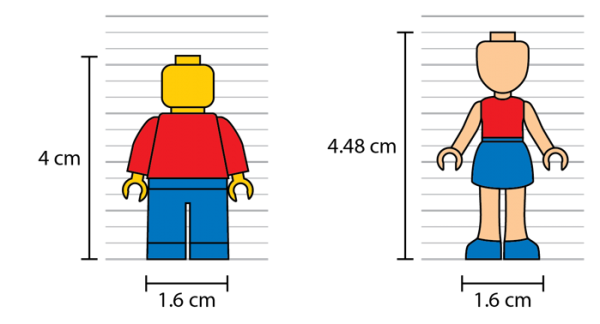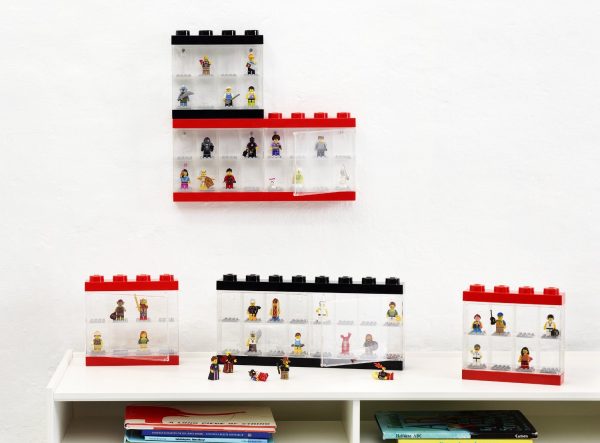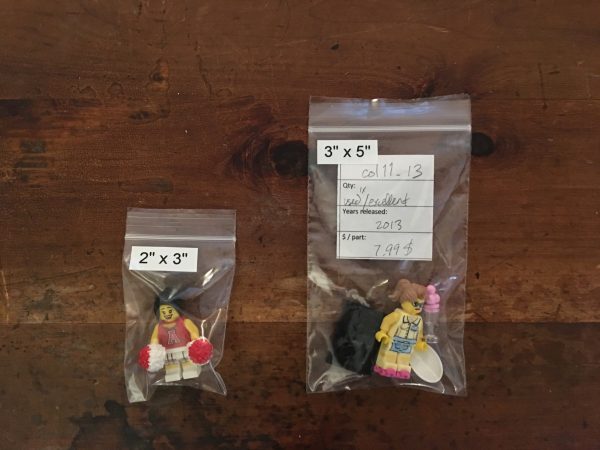Section II: Displaying & Storing LEGO Minifigures
By surveying nearly 200 LEGO enthusiasts, I learned that storage for LEGO Minifigures is the second priority after storage for LEGO bricks. I also learned that displaying their favorite LEGO Minifigures is important too!
That’s why Section II of my LEGO Storage Guide focuses on LEGO Minifigures.
Section II:
- Intro to Displaying & Storing LEGO Minifigures (current page)
- Chapter 7: Displaying LEGO Minifigures
- Chapter 8: LEGO Minifigure Storage
Introduction to Displaying & Storing LEGO Minifigures
The number of LEGO minifigures has skyrocketed in recent years — It is estimated that there will be more LEGO Minifigures than people by about 2019. As the number of minifigures has grown, so has the number of people collecting them.

XKCD webcomic predicted that the LEGO minifigure population will exceed the human population by 2019.
This growth is due to a variety of factors, including the introduction of the LEGO Collectible Minfigures Series in 2010. That series alone added nearly 500 brand new minifigure designs in just 8 years.
While the vast majority of the nearly 10,000 unique minfigures are not valuable, there are more than 60 minifigures which are worth more than 100$, and 20 worth more than 1000$. (Source: Minifigure Price Guide.)
Whether you have a small collection of favorite minifigs from your childhood, or a huge collection of rare collectibles, let’s look at some of the best ways to display or store your collection.
Types of LEGO Figures
The classic LEGO minifigure was introduced in 1978, but it isn’t the only LEGO figure — there are actually several different figure types and sizes in the world of LEGO. The most recent addition is the Friends minidoll, which was introduced in 2012. Both the minifigure and minidoll are about the same size, so most minifigure storage solutions will work equally well for both.
In addition to the LEGO minifigure and Friends minidoll, many LEGO enthusiasts collect a variety of similar figures which come in a wide range of sizes. While this guide is focused on minifigures, some of the storage solutions suggested in this guide might work for the following figures as well.
Other figures you might want to collect:
- Maxi-figures – Larger molded LEGO figures such as the Wampa (Star Wars), Trolls (Castle), or Hulk (Super Heroes).
- TECHNIC Figures – These are larger figures with more human-like proportions. (They were produced from 1986 – 2001.)
- Animals – LEGO has created a wide range of animals over the years. They come in a wide range of sizes: from tiny chickens, to horses, to elephants and dinosaurs!
Displaying LEGO Minifigures
In addition to storing and protecting your minifigures, you might want to show off your favorites. Some options are perfect for displaying your minifigures on a desk or shelf, while others allow you to mount them on your wall.
The best ways to display your LEGO Minfigures are called out in Chapter 7: Displaying LEGO Minifigures.
Storing LEGO Minifigures
A priority for many LEGO enthusiasts is to protect minifigures from dust or damage by storing them in plastic bags or tackle boxes.
The best ways to store your LEGO minifigures are explored in Chapter 8: LEGO Minifigure Storage.





Kmart are selling these minifugure display cases here in Australia. I just went and bought a couple for my new display.
They have a few different types, but this one lights up!
https://www.kmart.com.au/product/5-level-mini-figurine-display-case-43034109/
In our household we have duplo early figures to current day and lego minifigures. What would be the best way to store both duplo and minifigures. We also have duplo animals dinosaurs. We are tight for space literally my children would have about 80 to 100cm space. Add to this eldest wants to build a lego city. We are already heading towards 8000 bricks and 70 figures not including dinosaurs and animals by this xmas. What would be the best way to store them?
Helen,
I completely understand how a small space can interfere with your good intentions to have a well organized LEGO and DUPLO collection. I have no idea what will work best for your family, but I would probably opt to have a few bins for DUPLO and a few bins just for LEGO – both sorted into very coarse categories instead of finer groups. For example, you could definitely put all the DUPLO figures, animals and accessories into one bin, with angled/curved pieces in another bin, and a third bin for bricks and plates.
In general, you should sort into the fewest number of groups that meet your needs (especially with a modest collection), rather than going overboard with increasingly obscure categories.
—Tom
Just beginning to sort over 30 years of Legos. Your site has been extremely helpful and informative. Thank you!